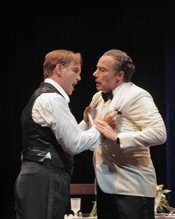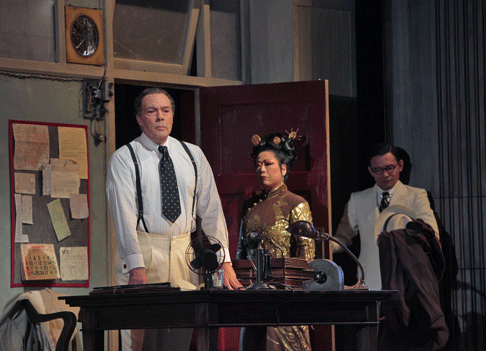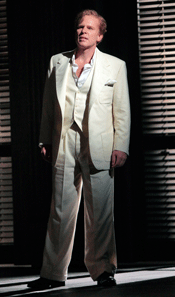01 Aug 2009
‘Opera Noir’ Entertains at Santa Fe
Can a famously successful movie be made into an effective opera? A quick answer is: yes!

Can a famously successful movie be made into an effective opera? A quick answer is: yes!
Santa Fe Opera has made it happen with William Wyler’s 1940 motion picture, The Letter based on Somerset Maugham’s 1920s short story and play, and now an opera. It may well be the sleeper of the Santa Fe season, unusual for a newly commissioned opera.
Within a dark toned sparsely furnished residential stage set, four collapsing palm trees grimly lowering in the background of a hot and smelly Malay rubber plantation house, a bored housewife is carrying on a torrid affair with a local dandy, her often absent and somewhat dull husband unaware. In the Wyler movie, the main feature of which is Bette Davis as Leslie Crosbie the erring wife, moments after the show opens we hear gunfire as her lover Geoff Hammond staggers across the verandah, Leslie emptying her six-shooter into him in a jealous rage. Bette Davis did it with fervor, and believe me, Santa Fe’s soprano Patricia Racette does the deed with equal vehemence. We were off to a strong start, and the intensity rarely lets up over the 100-minute opera.
 Anthony Michaels-Moore (Robert Crosbie) and James Maddalena (Howard Joyce)
Anthony Michaels-Moore (Robert Crosbie) and James Maddalena (Howard Joyce)
The Santa Fe team, led by composer Paul Moravec with librettist Terry
Teachout, musical director Patrick Summers and stage director Jonathan Kent,
took a chance patterning their new opera so closely on the ‘noir’
qualities of old movies, but that was exactly the tone they wanted to establish
for this sordid little story, and they got it right. Even more successful is
the musical score by Paul Moravec, a professor of music at Adelphi University.
Worry not, this is no academician’s tepid exercise — it’s a
rip-snorting adventure in high-class movie music with the likes of Bernard
Herrmann, Eric Korngold and Max Steiner hovering in the background.
Moravec’s music is fluent and beautifully orchestrated. The tonal score
is through-composed, no pauses for arias or set pieces aside from brief
moments, with a good sense of storytelling and excitement resulting.
It turns out Moravec, in his first opera, is a wise and able theatre composer who knows to keep his orchestra subdued for key passages of exposition and musical dialogue, but can unleash his violins and woodwinds in romantic mood music to evoke the sweeping “love me forever passages” of Leslie and Geoff’s affair. Don’t laugh, but when it comes to writing music and vocal lines that can narrate and sustain mood, Moravec impressed me as having it all over the cognoscenti’s current darlings, Kaija Saariaho or Osvaldo Golijov, also lately heard in new works at Santa Fe. Sometimes it feels good just to get down to storytelling without trying to make musical history.
 James Maddalena (Howard Joyce), Mika Shigematsu (A Chinese Woman) and Rodell Rosel (Ong Chi Seng)
James Maddalena (Howard Joyce), Mika Shigematsu (A Chinese Woman) and Rodell Rosel (Ong Chi Seng)
Meanwhile, back at the plantation, Leslie has been caught out not only in her affair with Goeff, but his murder as well. Once she discovered Geoff was through with her, preferring his new Chinese mistress, Leslie popped him off, a woman scorned. But that’s not all: her husband Robert has to come up with a lot of cash to buy back a letter Leslie stupidly wrote to Geoff inviting him over the night she shot him, a piece of evidence that would convict the lady. The letter fell into the hands of Geoff’s mistress, and now the Chinese woman wants to cash in. Of course it will ruin husband Robert Crosbie, played and sung with great effectiveness by Anthony Michaels-Moore, using his life’s savings to redeem his adulteress wife. Sticky, eh?
 Roger Honeywell (Geoff Hammond)
Roger Honeywell (Geoff Hammond)
Coming to the rescue is Howard Joyce, Robert’s lawyer friend, who
manages to buy and repress the letter, and convince a Singapore British jury to
let Leslie off, claiming she was the victim of Geoff’s violent attempt to
rape her. The one-act opera ends in a big mess, romance gone, careers
compromised, and then in a coupe-de-theatre, Leslie takes matters into
her own hands and resolves her dilemma. I’ll not reveal the quick
denouement.
Ms. Racette, Michaels-Moore, James Maddalena as the lawyer, and assorted secondary role singers could not have been any better. Roger Honeywell, Rodell Rosel and Keith Jameson, all tenors, played key parts in the show’s success, with the Santa Fe Opera orchestra and conductor Patrick Summers wonderfully effective in their central role. Patricia Racette is a marvel; her full lyric soprano voice is in solid shape, used with skill and much dramatic effect. She has an expressive face, and is an actor of the first order. It was a pleasure to encounter her strengths in this prima donna role. For now, she owns the part. Others will soon want to.
The Letter may to some degree be a work in progress; it seems fairly well finished, if a few minutes too long. The intensity of the Maupassant-esque plotting with all its ironies is well maintained, with good rhythm and tempo, rhetorically and musically. But in a departure from Maugham and Wyler, Morevec added a short scene in which the Chinese woman (the fine Japanese mezzo Mika Shigematsu), comes to the lawyer to deliver the letter and collect her cash. Unfortunately she is given not only a voice in the proceedings with a short aria, but brings up issues that only obfuscate and delay. I hope the authors will rethink that scene. Much effect was gained by Wyler in keeping his mysterious Chinese woman quiet — a strong presence but generalized. There can be too many ‘specifics,’ sometimes in dramatic plotting, and The Letter has a few. In the main it is unusually engaging, well-paced entertainment, handsomely performed.
J. A. Van Sant ©2009